Jean-Luc Picard is full of regret as he reaches the end of his life. Well, technically after he’s already died and had his consciousness transferred into a robot body, but we don’t talk about that. His lifetime in Starfleet, his role as an icon of moral authority, has all been because he took to the stars to run from something tragic in his past. To self-actualise and embrace his life’s work, he has to go back in time, literalise his issue of being trapped in the past, face the memories that haunt him, and convince another Picard, an ancestor acting as his proxy, that taking to the stars is the right thing to do. This is the core of Star Trek: Picard season 2 and it sounds pretty good. But it is not pretty good. It’s the worst season of Star Trek ever produced.
The first season of Picard was a mixed bag, to say the least. Wildly inconsistent with some good ideas, yet overly busy, melodramatic, and tonally misshapen. The second season doesn’t improve but rather doubles down on all of its flaws. That interesting core narrative arc is there but it is just one good thread in a tangle of bad ones. The writers pile on 87 different storylines and ideas, obfuscating everything under layer after layer of mysteries and unanswered questions which never pay off in a satisfying way. The second half of the season is truly awful but, despite seemingly getting off to a good start, the issues begin in the first couple of episodes.
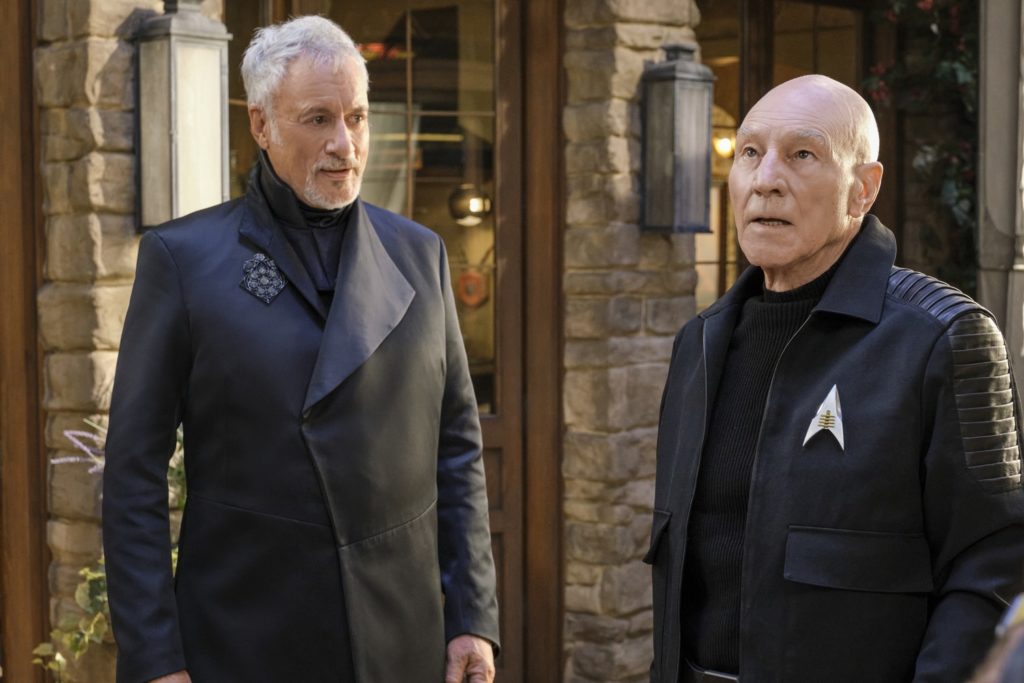
The season premiere is a decent beginning to a story, setting up the themes and ideas it will seemingly play with regarding Picard. And then the second episode completely ignores it and acts as another premiere, this time for a completely different story. The premiere begins a mystery with the Borg, suddenly erupting into action and chaos, and then, completely unrelated to the Borg storyline, we’re whisked off to an evil timeline which is just the Mirror Universe without technically being the Mirror Universe, which then leads to a time travel story to set right the timeline and ensure the Federation exists, completely forgetting about the Borg cliffhanger which doesn’t connect whatsoever. This pushes the show towards the unenviable task of having to set up two climaxes, even though it can’t effectively do so for one. There’s a bad thing in the normal timeline, then we cross over to the alternate timeline, and then we travel back in time to stop the alternate timeline from happening. This is one step too many. The Borg story needed to be excised.
The season is in need of something, anything, new. The main plot, or what I think is the main plot, is a mix of the Mirror Universe, First Contact, and The Voyager Home. Three of the most iconic stories in the franchise, if not three of the very best. There was no way Picard was going to top them so why even invite the comparison? Going back to 2024 for the bulk of the season may be an effective cost-saving idea but it is impossible to tell the story they want to tell at that point in time. Proving that recycling the time travel plot yet again was a bad call, the canon is too busy, too filled-in, for anything meaningful. The shows acts as if Renee Picard’s space flight is the fulcrum on which the future of humanity hinges. That her mission is what puts humankind on the path to utopia. We know it doesn’t. It’s going to get worse before it gets better. World War 3 is a couple of decades away; humanity will be nearly annihilated until Zefram Cochrane’s flight becomes the lynchpin on which the franchise encircles. This story has already been told.
There is a classic reason to tell such a time travel story, especially in Star Trek, and that is the opportunity it allows for commentary on our current world and its issues. The show attempts this but it is incredibly poorly executed, lacking any subtlety or genuine insight. It just says that our society sucks. The characters are shocked by the racism and anger they see in the past but this perspective only works if they come from the utopia that we know from classic Star Trek. In season 1, the 24th century presented was just as bad as the 21st we see here, if not worse. The show wanted to tell a different kind of Star Trek story in the first season and now wants to transition into a more classic tale, yet the world they created doesn’t allow that. The writers are pretending the first season didn’t happen. And then we see Guinan in 2024 and she decides to leave Earth because she’s disgusted by our current society. Now is the time she leaves? After sticking with us during both world wars and racial segregation, the writers want us to think 2024 is the worst point in human history?
The other attempted, and failed, commentary is on mental health. Now, I think there’s a good idea here somewhere. A new kind of time travel story with a problem to overcome that is more interesting than an event they need to effectuate. They need to change someone’s mind, or headspace rather. Renee Picard is depressed and, to ensure the correct future, she has to regain faith in her mission. It’s almost like Inception. Why explore the societal differences between the 21st century and the utopic 24th century yet again when the differences in mentality can be examined. It could look at the mental health crisis, at how comfort series like Star Trek help people in the real world almost in a meta way as those characters reach out to someone in 2024 to help them see life in a different way. But no. What we get is embarrassingly simple and borders on an offensive portrayal of mental health difficulties. Renee is depressed and we know this because people mention it and talk about her more than we actually get to know her as a character, and because she drinks alcohol a lot, which is the lamest and most hack way to show it. And how does she overcome her depression? Why, Picard gives her a brief basic speech full of platitudes which gets her to snap out of it, of course.
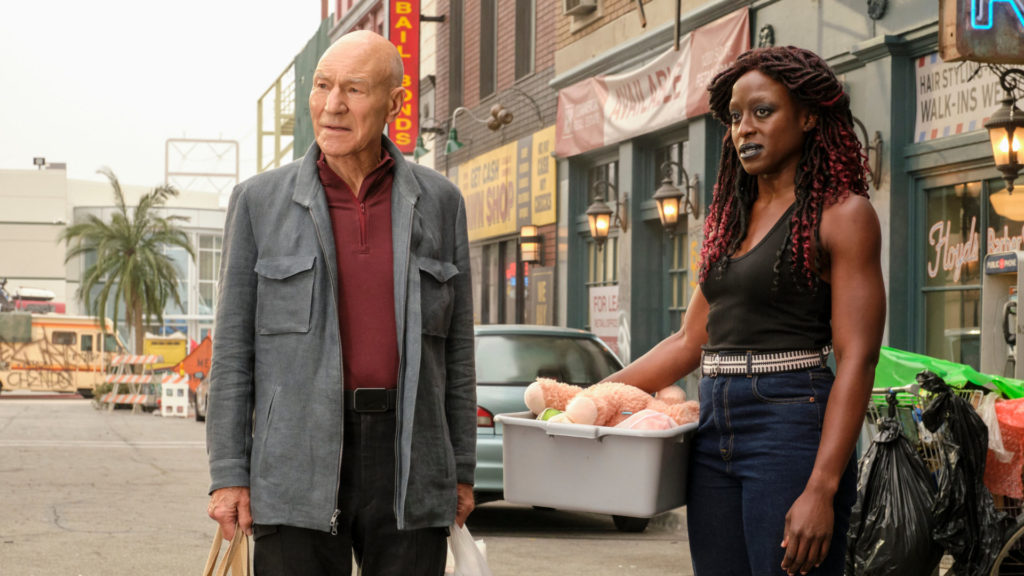
The characters have developed in the two years since the events of season 1 but we don’t see it. This wouldn’t be a problem if the entire drama around all of them wasn’t rooted in this unseen period we can’t relate too. Raffi and Elnor bond offscreen so we feel nothing when they are torn apart. Raffi and Seven’s entire relationship was offscreen but we should be invested in them getting back together? Jurati has been lonely for two years apparently so now wants to be a Borg. Then, for Rios, we see him being a happy guy in the first episode, a capable and respected captain of the Stargazer, but he apparently doesn’t like it and instead wants to stay in the 21st century where is only experiences are getting seriously injured, arrested, and racially abused by the government. And then Picard is suddenly in love with Laris as the season starts, with her husband having died to get him out of the picture. There is no reasonable way to continue this when they go back in time so for some unexplained reason, she has a 21st century doppelganger portrayed by the same actress for Picard to fawn over.
The entire sense of fun of these kinds of stories is to see Star Trek characters in a very different world than what they are used too, like Kirk being shocked at profanity or Scotty trying to talk into a computer mouse in The Voyager Home. The characters in this show are not Star Trek characters; there is no sense of them being out of time. They are just generic TV characters making the whole story a slog that doesn’t feel like the franchise. They are sweary action hero badasses who are willing to murder anyone in their way. Nor do they have interesting perspectives or thoughts on what is going on around them. There is no social commentary because there is no commentary outside stating that bad things happening are bad. No nuance or discussion. All the characters speak with the same voice too, from the sassy Borg Queen to the sassy Watcher character, whose entire purpose in life is to very carefully watch over someone and stay hidden and yet says things like, “Leap of faith. That’s how I roll.” Not because it matches her characterisation but because that is how these types of poorly-written characters speak. Any character in this show could say anyone else’s lines and you wouldn’t be able to tell.
For what is supposed to be a Picard character study, there are way too many characters in this season. They all get things to do in regards to plot, running from A to B for some reason or the other, but they have no actual story to tell with them. Seven has a story about what it is like for her to have no Borg implants but it is contained to just a couple of brief scenes every other episode. The writers believe merely mentioning something is the same as actively exploring it. The one character they do get rid off early on is Elnor in baffling fashion. He dies at the very start of the time travel adventure. It’s like if Spock had died at the start of The Voyager Home and then the film continued as a fun comedy. He dies, everyone is depressed for five minutes, and then the fun adventure begins with his surrogate mother Raffi making jokes. His death eliminates the one character who would be out-of-time-and-place in a way perfect for comedy and insightful remarks, and it ruins the tone.
Q returns to Star Trek as the kinda sorta antagonist of the season and, while I like many of his scenes, ultimately, he makes very little sense. John de Lancie gives a strong performance, feeling like a revved-up version of the Q of old, offering a vital new flavour to the tired tropes of the season, being a much angrier character. But for so much of the ten episodes, his motivations are hidden because everything in this show has to be a mystery until the lame reveals in the finale where there’s no time to actually explore what has been teased. There’s nothing to grasp on to.
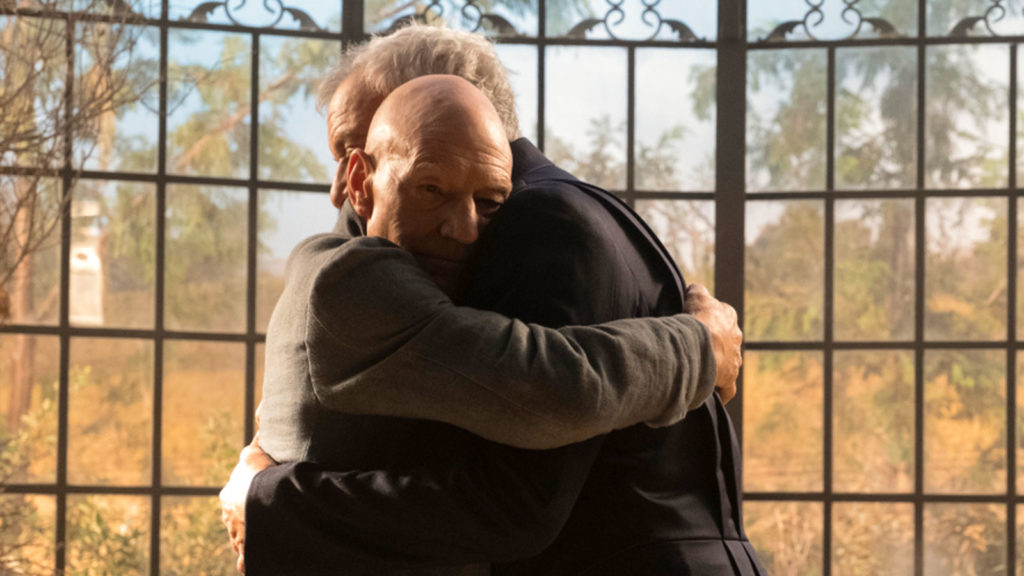
I like this angry version of Q but why is he so angry in the first few episodes? I have no idea. We learn he is dying but why? I can see him struggling with this news but then why is he suddenly back to normal in the last episode, perfectly content with his fate? He’s bipolar. The Q we get in the finale is not the Q we get in the rest of the season. What is the penance he speaks of in episode 2? Why this bizarre complicated plan to change the timeline if his goal was only about helping Picard overcome his trauma? Somehow that meant blackmailing someone to run over Picard in a car so he has a vision in his coma about his past. The show throws so much plot at you to disguise how dumb it all is. Just a simple, profound two-man play would have been all this story needed to be. And, after a season of conveniently losing his powers, Q’s powers return in the finale so he can send the crew home. How? I have no idea and the writers clearly don’t either.
Instead of focusing on Q, the writers create another, secondary antagonist for the season, besides the Borg Queen, to further confuse proceedings: Adam Soong. Instead of Renee’s mission for the future being the sole fulcrum for the possible futures, Soong is deemed to be another yet the show is never convincing in exactly how or why. Soong is in one episode a failed scientist shunned from the community and the next he’s leading a black-ops mercenary team on an operation to France. He’s introduced in a direct copy of the early scene from Star Trek Into Darkness with Q (Khan in the movie) offering Soong the cure to his daughter’s illness if he does his bidding, but by the season’s end, with no development, he’s just a generic bad guy to stop.
Not to mention that the story involving his daughter, Kore, is immediately undercut. He’s going to extreme lengths to help her survive, his only daughter, only then to reveal she’s a clone and have been, and can be again, many copies of her. Kore’s involvement is so unnecessary. Why bother having Q free her, which makes no sense, only to have to come up with some contrived way to remove her from the timeline at the end? I’m certain half the characters in the season only appear because the actors have contracts which had to be fulfilled.
The season’s cast does include some brilliant actors putting in good performances, but the words they are forced to say are pure nonsense. James Callis, Gaius Baltar himself, has a one-on-one conversation with Patrick Stewart and they are wonderful together. The script however is terrible. This is a show desperately attempting to be a prestige drama, full of intense character drama, but it is written by CBS writers whose only experience are procedurals. Monsters, the episode in which we journey into Picard’s mind, is perhaps the worst episode of Star Trek I’ve ever seen. Until Hide and Seek comes along two episodes later, which plays out like a shitty version of Skyfall. Yet in between these two is a story that is interesting, if the writers knew how to plot this kind of narrative effectively. Picard is able to overcome his emotional issues in Monsters, having recognised his memory was not the true version of events, and teaches this lesson to an FBI agent in the next episode, passing along what he has learnt and showing how he has grown as a character. Good stuff if it didn’t stop the show dead with the second imprisonment storyline of the season, destroying any pacing and dragging things out until the finale.
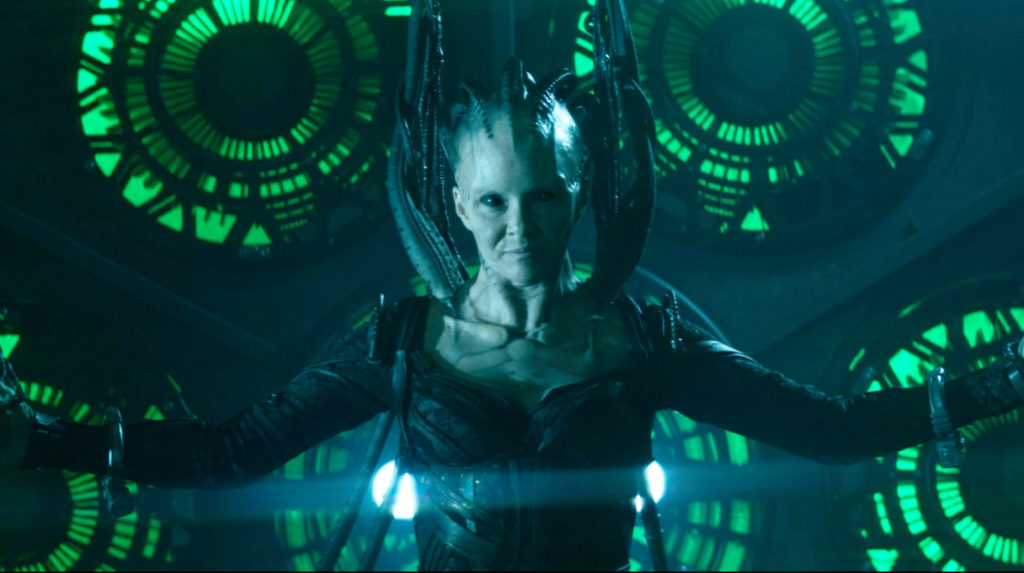
The season contains a blissful misunderstanding of the Borg which retcons the race in the most reductive way possible. It’s been a long time since the Borg were scary or interesting, Voyager milked them to creative bankruptcy, but now, philosophically, they no longer resemble the race they were in TNG. Instead of the Borg as a collective intelligence, the show doubles down on the Borg Queen not merely being a face representing the collective for diplomacy, a creation of the collective, but rather the leader and creator of the collective herself, which is idea the franchise has previously shied away from, and I hate. And here, through Jurati’s reasoning, the Borg Queen has assimilated entire peoples simply because she is lonely.
There’s none of the scary twisted philosophy or reasoning, just simple human emotion at the heart of the Borg. It’s terrible. And the Queen decides not to be lonely anymore by melding with Jurati and building a better Borg. The threat which eliminates all individuality, the terrifying inverse of all that is important in Starfleet, is now good because they are just going to assimilate depressed people from now on? The show is saying that surrendering to the Borg is better than fixing your problems? It is truly a horrific statement for a Star Trek series to make.
“Must it always have galactic import. Universal stakes? Celestial upheaval? Isn’t one life enough?” Q says this to Picard during their final conversation and it is clear the writers are self-aware of modern Star Trek’s penchant for stupidly high stakes. Despite the huge timeline repercussions, Q’s true goal was focused very much on Picard’s mental wellbeing. It’s executed in a terrible way but I like the idea. And then, two scenes later, a giant galaxy-destroying event is revealed and stopped within five minutes and it’s clear the writers have not learned anything. Instead of a personal ending with Picard, we have to cut back to the Borg story from the first episode, which struggles to connect in any meaningful way so creates and solves drama from nothing. Picard himself has learnt nothing to impact his decision making upon return to the future timeline. This all should have been driving towards him making a new choice on the Stargazer, putting his new perspective in action, but nope. He just stops the ship’s detonation and reveals the Borg Queen as Jurati, who could have made her identity known at the start to avoid everything that happens but decided not to because the plotting is so outrageously ill-conceived.
I feel I’ve barely scratched the surface with everything wrong in Star Trek: Picard’s second season. So not to write a novel, I’ve only noted the core issues and major story beats; every episode is full of baffling choices and decisions which contribute to it being the worst season of any Star Trek series produced. The first season of The Next Generation has finally been usurped, which now seems like a series of fun failures compared to this show’s long frustrating one. But I do have hope. Hope that season 3, the final season, which sees the return of all the original TNG cast members, will be an improvement. It has to be, right? Showrunner Terry Matalas was busy plotting season 3 while others were dealing with the bulk of season 2 so, despite them being shot back-to-back, hopefully what went wrong with the second season won’t repeat in the third.
What are your thoughts on Star Trek: Picard season 2? Let me know in the comments and be sure to geek out with me about TV, movies, and video-games on Twitter @kylebrrtt.




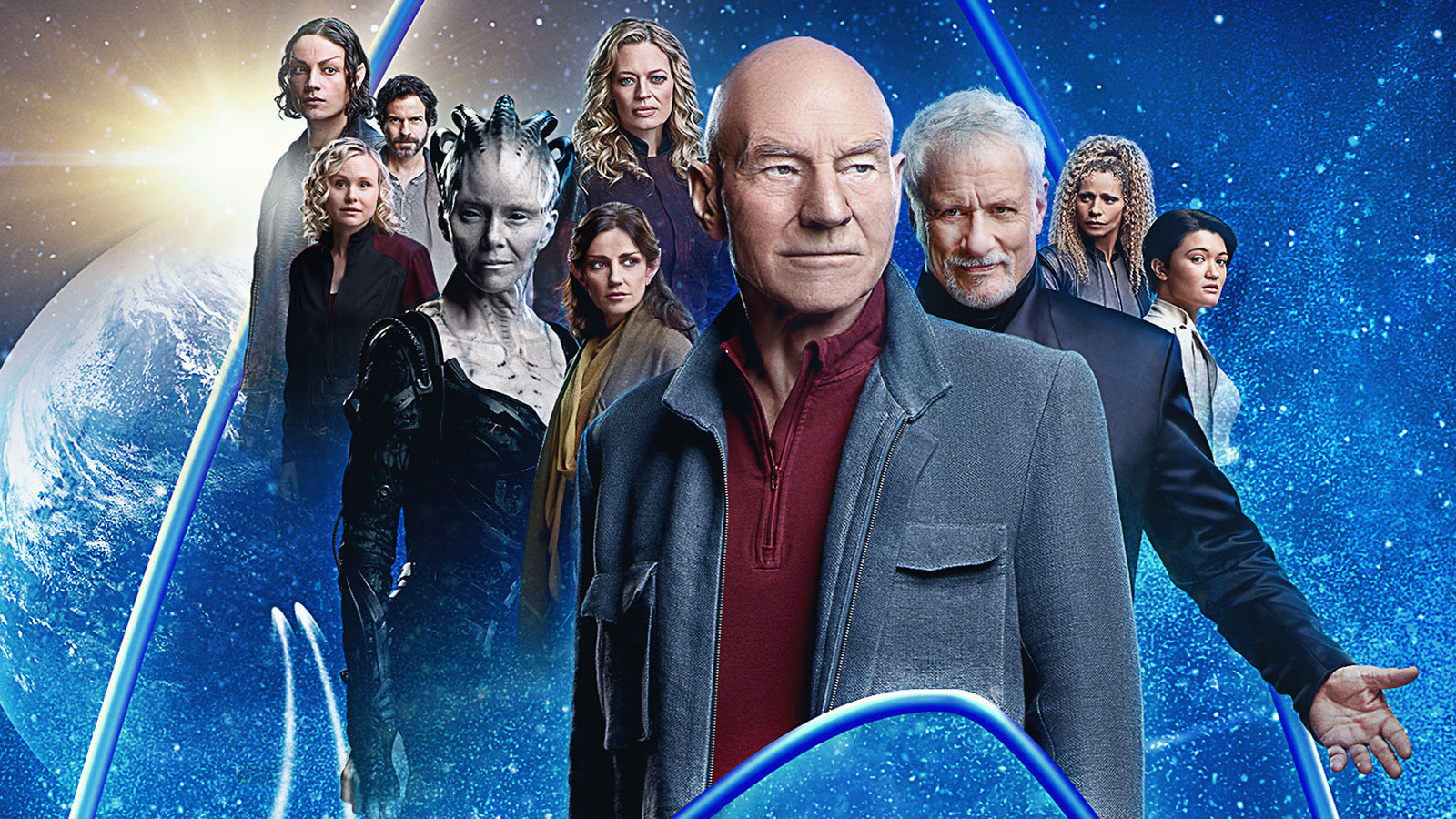

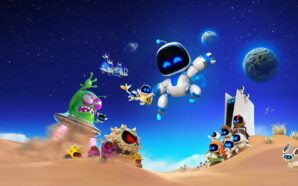
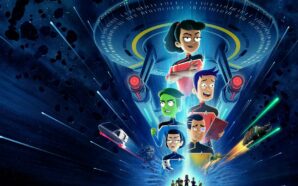
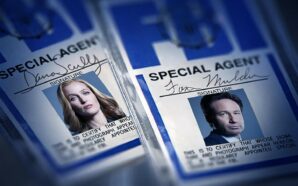
Everything you’ve written is totally correct! We’re forcing ourselves to finish the second half of S2 in time for S3 but it is abysmal. it’s like they understand nothing of the pull of star trek or have any writing skills whatsoever. Really hope S3 is better